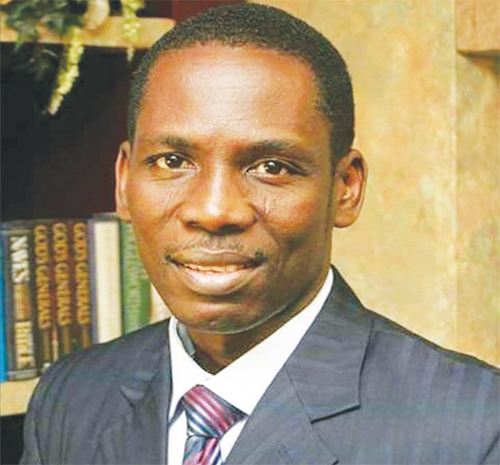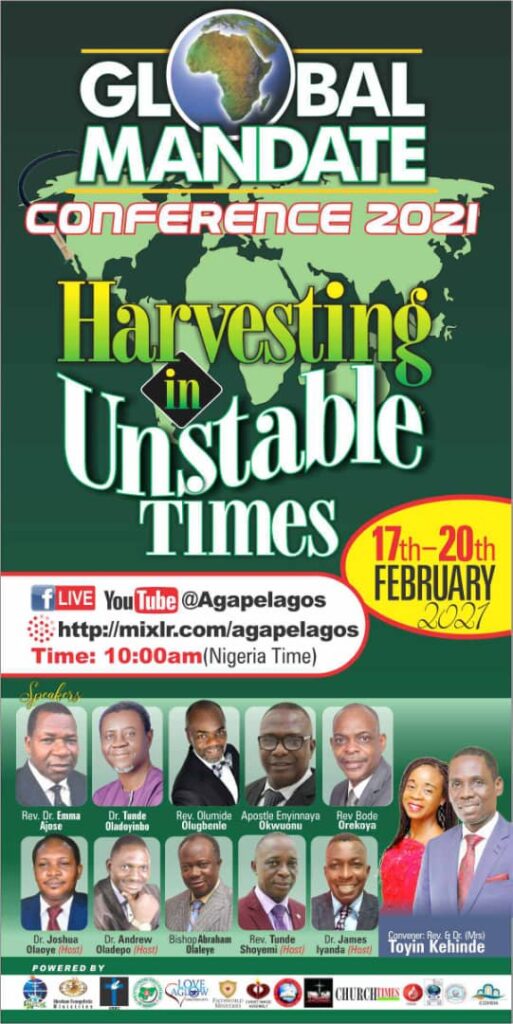Rev Toyin Kehinde is the Senior Pastor and founder of Agape Generation International Church. He and his wife, Sade are the conveners of Global Mandate Conference which is a yearly conference that brings missionaries from across the continent of Africa and beyond together for brainstorming, fellowship and networking. In this interview with Church Times, Rev Kehinde gives a rundown of how the conference will hold this year given the covid-19 pandemic that is ravaging the world. He also talked on the journey of missions so far.
What has been the feedback from the missions’ field after the 2020 GMC conference?
We have not been able to do an on-the-spot assessment of the fields because of the pandemic. The missionaries that came for the 2020 GMC were over 200. We had a glorious meeting and I believe they were all blessed and refreshed. They went home, recharged and encouraged to go and do the work. Unfortunately, not long after the conference, the nation was on lockdown. We could not reach them the way we used to. Usually, after the conference, we visit them on their various fields as time and resources permit to access the situation.
They also could not move around. Those who were to reach them with support also could not do so because their businesses went down because of the pandemic. They had to reduce their running cost. People gave less offerings and tithes because of the paucity of funds and thereby funds that could readily be available for missionaries were reduced.
On our part as a church, we still tried to pay the missionaries under our care 100 percent of their salaries. Our staff in the church had to sacrifice 25 percent and times 50 percent of their own salaries so we could maintain the payment we make to missionaries.
We did this because many of the missionaries have nowhere to run to. We ensured that the allowances for the missionaries were regular though we know they also get support from other sources. But then, the support can’t be too much, given the peculiar nature of what they do. It is the support from us and other sources that encourage them to stay on the field.
We know however that the Lord is their ultimate encourager and supporter.
But how were they able to do their work as missionaries during the lockdown?
Most of them live in small communities and they are closely knitted communities. Everybody knows everybody somehow. Their movement most times are on foot. So, covid-19 did not affect their work so to say. It’s only when they want to move outside their locations that they have challenges. The work of preaching still continues but it’s just that it is emotionally challenging now since people can no longer go to visit them.
Would you say there are new lessons on missions’ fields given the challenging global situation?
Yes, especially with covid-19. We are beginning to learn that time is not on our side and that we need to get the message of the gospel out as fast as possible. The person you see today, you may not see tomorrow. We need to get this good news to people as fast as possible.
I have also learnt that we should not limit ourselves to the traditional ways of preaching the gospel and discipling converts. We need to devise some other ways of doing that.
Another lesson is that the global church also needs to think strategically. Now we talk on zoom and other applications. If we are restricted from using these platforms, how are we going continue to preach the gospel? The owners of these platforms can decide to restrict us because they don’t like our message.
The people who banned Trump from Twitter did not like his message; whether good or bad. It can also be that some people may come up and say they don’t like the message of the cross. Now on movies the name God is being censored on some Cable networks. The issue is what are we going to do if some authorities decide they don’t want our message. We really need to think in this direction. We need to think and be proactive before that time comes. We should have ready-made alternatives.
During the recent elections in Uganda, the internet was shut down. There was a time restriction was placed on calls from Dubai to Nigeria from what I gathered. So, we may be heading for some challenging time in the future as regards preaching the gospel if we don’t have a plan B.
But what is the alternative for those who can’t even afford the technologies that we use for propagating the gospel?
The alternative is radio broadcast which I think is cheaper and easily accessible. But you need a radio station licence from the government. So, it still comes back to the same thing about censorship. The challenge we have in the northern part of Nigeria with Christianity for instance is a big challenge. Even in city centres, to get a certificate of occupancy is a tough one. The church has to really brace up for a challenging future as regards the spreading of the gospel. But then, I know and I am persuaded that God will always make a way for those on the field.
You have been holding this GMC conference for years. One of the visions is to get more city pastors to support missionaries. Are you encouraged with the responses so far?
It has been encouraging so far. But then I see the race as a long-distance race. There are testimonies of pastors who have been following what we do and have taken a cue from what we do. I know a couple that have been supporting who placed a direct debit order on their account because they found that the account was always liquid despite withdrawals, meaning God has been blessing them. There are many other instances of people who have shared how God has been blessing them after they began supporting missions.
Despite the encouraging support we get, I still think the Church in Lagos is still spending less than 1 percent of its income on missions. We are still very far from our goal. The churches involved in the support project are still very few. We are certainly not where we were some years ago. But we are not yet at the dream-land. I believe we will go higher and higher as more people come to support the work from this year’s conference.
Talking about this year’s conference, what are your plans?
Because of Covid-19, we can’t gather missionaries from all over as we used to. Last year we had missionaries from 10 nations. Now we can’t do that because the logistics will not support it. If missionaries are to travel from other countries, they will be quarantined for days before they will access the country.
For those in Nigeria, it will be challenging to ask missionaries not to hug themselves when they meet for the first time after one year. So, it’s better not to bring them to a large gathering to forestall such temptation of hugging. We also discovered that we have to increase the hotel accommodation for them if we still feel like going ahead with the usual number. That will be an added cost.
When we considered all these logistical problems, we decided to have the conference both on-site and online and also to have it in different locations. We are not bringing all the pastors in one location.
The conference will be done one day after the other for four days with different audience starting from Feb 17 to 20. The beauty of it is that we will stream all the proceedings online. Most of the missionaries will be joining online. We have been doing some of our pre-conference meetings online to intimate them with the process.
What is the current mood on the missions’ fields under your watch?
There is a general atmosphere of fear everywhere. The fear of the pandemic is there. The fear of terrorists, kidnappers and all sorts are there. I discovered that many believers are not being taught to lay their lives for the sake of the gospel. We are all trying to keep safe. It is good to keep safe and take all the precautions. But the truth is that we have a commission that has to be obeyed and that is what those on the field are doing at the risk of their lives. I have had cause to go to missionaries in terrorists’ prone areas and I get encouraged by them. They tell me to tell those in the cities that they should stop telling them to leave their land and come to a safe place. They said the bandits and terrorists want to take their land and also take their faith, and that they will not allow that.
That is the point. There is a little light on these fields. If the little light should leave, I can imagine the darkness that will fall on the land. So, missionaries who are on the field see their presence there as that of a fire-fighter who is going to rescue those in the danger of fire. While some people are running away from fire, they are going into the fire to rescue those who are perishing. That is what is driving those on the field.



